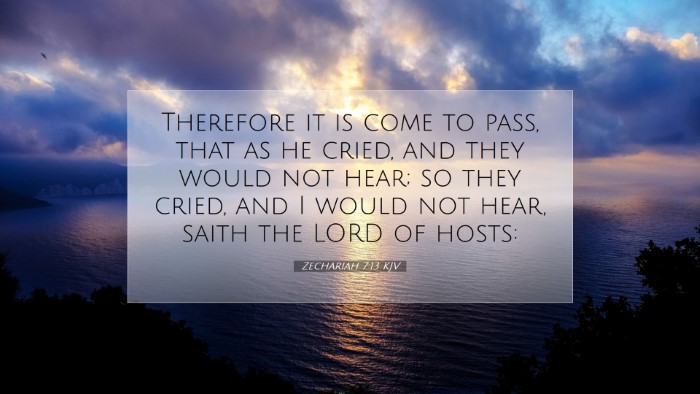Old Testament
Genesis Exodus Leviticus Numbers Deuteronomy Joshua Judges Ruth 1 Samuel 2 Samuel 1 Kings 2 Kings 1 Chronicles 2 Chronicles Ezra Nehemiah Esther Job Psalms Proverbs Ecclesiastes Song of Solomon Isaiah Jeremiah Lamentations Ezekiel Daniel Hosea Joel Amos Obadiah Jonah Micah Nahum Habakkuk Zephaniah Haggai Zechariah MalachiZechariah 7:13
Zechariah 7:13 KJV
Therefore it is come to pass, that as he cried, and they would not hear; so they cried, and I would not hear, saith the LORD of hosts:
Zechariah 7:13 Bible Commentary
Commentary on Zechariah 7:13
Zechariah 7:13 states: "And it came to pass, that as he cried, and they would not hear; so they cried, and I would not hear, saith the Lord of hosts."
This verse encapsulates a theme of divine justice and responsiveness, highlighting the reciprocal nature of communication between God and His people. The context surrounding this verse is critical for understanding its implications, as Zechariah delivers a message addressing the behavior of the Israelites in response to God’s previous admonitions.
Exegesis of the Passage
The phrase “as he cried, and they would not hear” refers to the prophets whom God sent to call Israel to repentance. The failure to heed these warnings illustrates a broader spiritual malaise amongst the people—a hardening of their hearts towards God's message.
In contrast, the second half of the verse, “so they cried, and I would not hear,” signals a profound theological truth: God's silence in response to the people's insincerity. This cyclical pattern of neglect on both sides serves as a cautionary tale for believers. Just as the people ignored God's call, they would find their cries for help falling on deaf ears when they finally sought God amidst their despair.
Insights from Public Domain Commentaries
Matthew Henry’s Commentary
Matthew Henry emphasizes the seriousness of neglecting God’s voice, asserting that the consequences of ignoring divine guidance are dire. He suggests that the children's disregard of their parents' counsel mirrors Israel's neglect of God. Henry states that God’s refusal to listen to the people’s cries is a form of judgment, indicating that persistent disobedience leads to spiritual desolation.
He further elaborates that God often speaks through various means, including His prophets and, ultimately, Scripture. When the people choose to ignore these, they sever the line of communication with God. This principle urges leaders and congregations to remain receptive to God’s word, highlighting the reality that while God's mercy is boundless, His patience may wear thin in the face of continued disobedience.
Albert Barnes' Commentary
Albert Barnes articulates that this verse reflects the principle of divine disconnection resulting from human rebellion. He posits that God initially extended grace and a chance for repentance, but the people’s refusal led to a state where God's responses are absent.
Barnes notes that the imagery of crying indicates a desperation often found in the aftermath of spiritual neglect. Just as the Israelites faced the consequences of their actions, contemporary believers are reminded that a hardened heart leads to a spiritual void where God’s voice becomes unreachable. This commentary underscores the necessity for true repentance and a return to God, advocating for prayer and sincere pleas for divine mercy which can break the silence.
Adam Clarke’s Commentary
Adam Clarke draws attention to the relationship between the first and second halves of this verse, suggesting that both reflect a covenantal relationship between God and His people. Clarke argues that God’s silence can often be a form of discipline intended to awaken a sense of urgency in those who have strayed from His will.
Clarke elaborates on the notion of reciprocity in prayer and divine communication, observing that just as Israel chose to ignore God, their cries in times of trouble would similarly be ignored if they persisted in their unfaithfulness. This commentary calls for a heart check within the community that professes faith in God, urging believers to evaluate their receptiveness to His guidance and their sincerity in prayer.
Theological Implications
The verse inherently presents a theological tension between God’s justice and mercy. It highlights an essential truth about divine-human interaction: God desires a relationship characterized by dialogue, responsiveness, and adherence to His statutes.
- Divine Justice: The principle that persistent disregard for God’s word will yield consequences, ultimately leading to God’s silence.
- Human Responsibility: Emphasizes the agency that individuals possess in their responses to God’s call.
- Importance of Repentance: This passage encourages believers to turn back to God, recognizing that sincere repentance will always meet with divine mercy.
Practical Applications for Today
This verse serves as a poignant reminder for pastors, students, theologians, and Bible scholars to foster an attentive and open heart towards God. It challenges contemporary believers to consider how their own lives may reflect a pattern similar to that of ancient Israel.
- Listening to God: Create spaces for spiritual reflection, prayer, and devotion, ensuring that time is taken to listen to God’s voice in Scripture and in personal prayer.
- Responding to His Word: Encourage a community-oriented approach where church leaders are engaged in teaching and facilitating responses to God’s messages.
- Fostering Mental Repentance: Engage in conversations about the importance of repentance not just as a one-time act but as an ongoing posture of the heart.
Conclusion
Zechariah 7:13 serves not only as a historical admonition but also as a timeless reflection on the relationship between God and His people. It emphasizes the responsiveness that is critical in the life of faith—both in heeding God’s calls and in genuine and earnest cries for help. Let this verse inspire an ongoing dialogue between believers and their Creator, paving the way for a vibrant, responsive community of faith.


